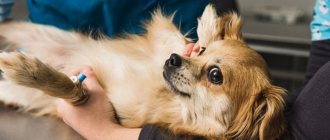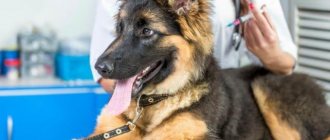If a dog appears in the family, you need to think not only about nutrition and care, but also about the health of the pet. While walking on the street, she can become infected with dangerous infections transmitted in different ways.
Pathogens can be brought into the home on clothing or the soles of shoes. Timely vaccination according to the calendar will help protect your dog from various diseases.
In the article we will look at the importance of vaccinations for dogs, what diseases they protect against, types of drugs and vaccination schedules, contraindications.
Why is vaccination necessary?
A vaccine helps a dog develop immunity to a specific infection.
It contains fragments of an infectious agent, which, when entering a living organism, causes a corresponding reaction in the form of the production of antibodies. Subsequently, if the pet encounters a similar invasion of infection, it will not get sick or the disease will be mild. Dangerous diseases of dogs for which mandatory vaccination is carried out:
- rabies;
- plague;
- enteritis (parvovirus, coronavirus);
- adenoviral infections;
- leptospirosis;
- infectious hepatitis;
- parainfluenza;
- parvovirus
There are also vaccines against lichen, trichophytosis, and microsporia.
Who gives birth to painful death?
Rabies (from Latin rabies - “rabies”, from ancient Greek “water, fear”, i.e. hydrophobia, hydrophobia) is a fatal viral disease.
Structure of the rabies virus
The causative agent of rabies is a neurotropic virus (Rabies virus) that affects nerve cells in the spinal cord and brain. Because of this, the rabies virus is accessible to the immune cells of a dog or cat only at the time of the bite when the blood vessels are damaged. Therefore, only during this period can the protective cells created after the vaccine work. However, if the vaccination was not initially given or emergency assistance was not provided immediately after the bite, then the virus subsequently enters the nerve cells, where the body can no longer provide a protective response, since this is only possible within the circulatory system.
But the virus has a “weak point” - it is very unstable in the external environment: it dies in 15 minutes when heated to 56 °C, and in just 2 minutes when boiled. Sensitive to ultraviolet and direct sunlight, to ethanol (alcohol, vodka) and to many disinfectant solutions. However, it is resistant to low temperatures and phenol!
What is rabies
Types of vaccines for dogs
Nobivak preparations for dogs help prevent the development of the most common viruses
Based on the active component, dog vaccines are divided into attenuated and inactivated. The former are pathogens capable of reproducing. However, due to their weakening, they cannot cause the disease itself, but only stimulate the production of antibodies. The inactivated version is represented by dead microbes. Such vaccinations have a slow and short-term effect, so they need to be repeated.
In addition, there are mono- and multivalent vaccines. In the first case, the composition includes antigens of only one infectious agent. Examples of such vaccines are: Biovac-D, Multikan-1, EPM, Primodog, Kanivac-SN, Rabizin. Several infections are included in the composition of polyvalent drugs. These include: Multikan-4 (6.8), Nobivak, Hexakanivac, Vanguard-7 and others. Multi-strain drugs, as a rule, are not given to puppies, as they put too much strain on the immune system.
Vaccines can be of domestic or foreign origin. Among the Russian drugs that have proven themselves well are: Hexakanivac, Multikan, Vakderm, Polivac. Among the “foreigners” the following stand out: Nobivak, Eurikan, Vanguard, Hexadog. Each drug has its own characteristics and administration regimens.
Most often, vaccines are given subcutaneously (at the withers)
Vaccination of adult dogs
Vaccination of an adult dog
Dogs over one year old are required to receive annual vaccinations: injections are given once at regular intervals. It is allowed to vaccinate four-legged friends against infectious diseases once every 2 or 3 years, but the rabies vaccination must be given strictly after 12 months.
If the dog is elderly or elderly, then the decision about whether to give injections or not is made based on its health condition. The vaccine can provoke an exacerbation of the pet’s chronic diseases and further weaken the immune system. Again, a rabies vaccination should be given in any case. According to current legislation, the owner cannot refuse it.
What to do after vaccination
Many novice breeders do not know what to do after vaccination. In general, there is nothing wrong with this, since you definitely don’t need to do anything special. It is only necessary to observe the puppy and if any oddities appear in his behavior, or if there are visible signs of a deterioration in his general condition, notify the veterinarian. In addition, the vaccinated pet should be provided with complete rest and good feeding. This contributes to the formation of high-quality, strong immunity.
How to vaccinate correctly
In order for the vaccination procedure to have only a positive effect on the dog’s body and not lead to complications, you need to adhere to some rules.
- The dog must be completely healthy. Even the slightest malaise, lack of appetite, fatigue and other conditions are reasons for postponing the injection.
- Before vaccination, your pet must be dewormed. Anti-worm medication must be given 14 days before the procedure.
- It is not advisable to vaccinate dogs while they are changing their teeth. A number of drugs have the ability to change the color of tooth enamel.
- Vaccinations are not recommended for puppies under 8 weeks of age. Early administration of the vaccine will weaken the immunity acquired from breast milk. And since they don’t yet have their own, the puppies may be completely defenseless against infectious diseases.
- In addition to deworming, the dog must be treated for external insects. The treatment is carried out the same way two weeks before vaccination.
- Most vaccines have a negative effect on the development of the fetus, so if dogs are to be mated, the vaccine should not be given. At least 12 weeks must pass between vaccination and mating.
- It is best to vaccinate on an empty stomach.
- If your dog is prone to allergic reactions, you can first give it an antihistamine. Which one it is better to consult a doctor.
We should not forget that after vaccination, the pet may develop anaphylactic shock, so for the first few minutes you need to stay close to the veterinary clinic.
Where do dogs get injections for major viruses?
Exceptions and contraindications
Dogs are vaccinated according to the vaccination calendar, but in some cases the procedure has to be postponed for a certain period. There are also some contraindications to vaccination of some animals. Let's take a closer look at this issue.
When not to vaccinate your dog:
- The animal is sick.
- Low immunity.
- Vaccinations are not given to puppies under 2 months of age.
- During the period of change of milk teeth.
- Before mating (90 days quarantine after vaccination).
- The dog was found to have an individual intolerance to the components included in the vaccine, which manifests itself as an allergic reaction.
Puppies growing up without a mother can receive their first vaccination at 6-8 weeks. This is due to a lack of natural immune protection, which the baby could not receive from mother's milk.
The timing of vaccination may change due to the epidemiological situation in the area. For example, if outbreaks of certain infections are recorded, the dog may be vaccinated ahead of schedule.
Features of rabies vaccination
Although the overall situation with rabies in Russia is favorable, the possibility of an outbreak of this dangerous disease remains. Russian legislation obliges every owner of a four-legged friend to vaccinate him once a year. If the dog owner refuses to vaccinate his pet, he will face administrative punishment.
The law also provides for free rabies vaccination. Such vaccinations are not included in the cost of services even in private clinics. To get an injection, you can go to a state veterinary hospital. Often, primary comprehensive vaccination against infectious diseases in a state hospital is paid for, and further actions according to the scheme will be free. Moreover, if you get a rabies vaccination in such an institution, then the accompanying events will also be carried out free of charge. Among them: examination of the animal, anthelmintic therapy, registration of a dog passport, installation of a chip.
Russian legislation
Vaccination against rabies in dogs is included in the mandatory list of vaccinations in Russia. Unvaccinated pets are prohibited from traveling abroad, participating in exhibitions and breeding. They may also be refused admission to some veterinary clinics, citing an increased risk of infection.
Thanks to its consolidation at the national level, the vaccine is administered completely free of charge. This service is provided by regional government clinics. Please note that this social program only applies to vaccines containing rhabdoviruses. Vaccination against other infectious diseases is carried out only on a paid basis.
How much does vaccination cost?
Prices for preventive vaccinations for dogs vary depending on many factors:
- features of the vaccine (manufacturer, composition);
- vaccination location (home or clinic);
- pricing policy of the veterinary institution (budget, average, premium, luxury).
For example, giving an injection at home will cost 500 rubles more than if you bring your pet to the clinic. It will be more expensive to vaccinate a dog with an imported complex vaccine than a domestically produced one. On average, the cost of a comprehensive vaccination is about 1,500 rubles.
Don't forget to vaccinate and your dog will be healthy!
Where is the best place to vaccinate?
Many owners try to vaccinate their pet at home. On the one hand, the dog feels more confident, which has a positive effect on its health and ability to tolerate vaccination. However, there is a danger that the animal’s condition may sharply worsen, for example, due to an allergic reaction, anaphylactic shock, and then emergency veterinary care will be required.
It is best to bring your pet to the clinic, undergo a preliminary examination, get a vaccine and wait a while. You can walk around the clinic or sit in the car. After making sure that everything is in order with the body’s response, you can go home.
Any owner wants to see their pet healthy and cheerful. The key to such a dog’s condition is timely vaccination.
Preparation for the procedure
The main cause of complications after the procedure is non-compliance with recommendations for preparation and post-vaccination quarantine. 2 weeks before the event you need:
- Regularly measure temperature and monitor stool quality. The appearance of alarming symptoms is a serious reason to postpone vaccination, so be sure to make sure that your pet is completely healthy.
- Stick to your usual diet, avoiding introducing new foods. You will only have to refuse food 4 hours before the start of the event.
- Treat against ecto- and endoparasites. In case of direct infection, the date of the procedure will have to be postponed.
Special care will be required when preparing the puppy. Before vaccination, the baby is prohibited from contacting other animals and people dressed in outerwear and street shoes.











